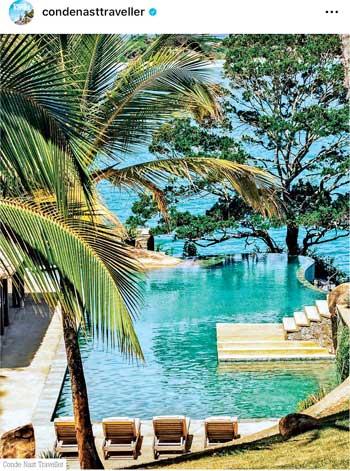02 Mar 2024 - {{hitsCtrl.values.hits}}
 Embarrassingly, it took a YouTube video from Aquaman himself for me to learn that Sri Lanka had been awarded, “recognition as the UN World Restoration Flagship,” for mangrove regeneration by the UN Environmental Programme (UNEP). These awards, conferred by the UNEP Programme and the Food and Agriculture Organization of the UN, target initiatives that are conserving, mitigating and/or counteracting ecosystem degradation.
Embarrassingly, it took a YouTube video from Aquaman himself for me to learn that Sri Lanka had been awarded, “recognition as the UN World Restoration Flagship,” for mangrove regeneration by the UN Environmental Programme (UNEP). These awards, conferred by the UNEP Programme and the Food and Agriculture Organization of the UN, target initiatives that are conserving, mitigating and/or counteracting ecosystem degradation.
Sri Lanka’s Ministry of Environment, local communities, and partner organizations (including the governments of the US, UK and Australia) have been diligently working, without fanfare, to strengthen our coastal defenses. Their efforts have been focused on regenerating 10,000 hectares of mangrove forest by 2030, bolstering the country’s vegetation coverage by over 50%: “with 5000 households to benefit and more than 4000 new jobs to be created.” (source: UNEP.org) As we live on a small island, we are particularly susceptible to the dangers of an eroding coastline. These mangroves act as the initial defense for our precarious seashore, protecting it from the depletion caused by waves, tides, and currents.
 After the tsunami, it became apparent that villages with untouched mangroves experienced far less damage than those without: “It showed that two people died in the settlement with dense mangrove and scrub forest, while up to 6000 people died in the village without similar vegetation.” (source: BBC.com) It was after the tsunami that Sri Lanka’s Ministry of Environment committed to a major initiative to plant mangroves, but unfortunately, only 3% of those young shrubs survived, forcing a pivot in strategy from planting to nurturing existing mangroves; 500 hectares have thus far been replenished.
After the tsunami, it became apparent that villages with untouched mangroves experienced far less damage than those without: “It showed that two people died in the settlement with dense mangrove and scrub forest, while up to 6000 people died in the village without similar vegetation.” (source: BBC.com) It was after the tsunami that Sri Lanka’s Ministry of Environment committed to a major initiative to plant mangroves, but unfortunately, only 3% of those young shrubs survived, forcing a pivot in strategy from planting to nurturing existing mangroves; 500 hectares have thus far been replenished.
This UNEP award will make Sri Lanka eligible additional funding (current requirement: approx. $3.5 million) Community-led groups are playing an integral part in this delicate rebalancing of the ecosystem, making Sri Lanka’s campaign a model for collaboration. In addition, Sri Lanka is a mangrove restoration pioneer – it was the first country to pass legislation to protect these precious coastal trees back in 2015.
Hot on the heels of this UNEP accolade is Sri Lanka’s Pekoe Trail’s topping of the National Geographic’s Best of the World 2024 list. The curated selection showcases the most exhilarating and breathtaking travel experiences, highlighting our 300 kilometer-plus path attraction - the country’s first long-distance walking/hiking trail, stretching from Kandy to Nuwara Eliya, With 22 distinct trails on offer, visitors of all ages and abilities can enjoy treks for a few hours or for multiple days. The trail’s sleek and user-friendly app features interactive maps that can be utilized in low-service areas or entirely offline, with sustainability tips shared along the way.
 Marketed as an opportunity to follow the storied pathways of tea-planters, tea-pickers and horse-drawn carriages, the trail also highlights Sri Lanka’s nature and culture, while also bringing economic empowerment to vulnerable communities. Small restaurants, shops and homestays have cropped in places where there none previously. The Pekoe Trail encompasses many national treasures including the Temple of the Sacred Tooth Relic, Ella Rock, Nine Arches Bridge and Ravana Falls – to name a few. Other attractions along the route include paddy fields, tea factories, temples, cooking classes and tea-breaks (but of course!).
Marketed as an opportunity to follow the storied pathways of tea-planters, tea-pickers and horse-drawn carriages, the trail also highlights Sri Lanka’s nature and culture, while also bringing economic empowerment to vulnerable communities. Small restaurants, shops and homestays have cropped in places where there none previously. The Pekoe Trail encompasses many national treasures including the Temple of the Sacred Tooth Relic, Ella Rock, Nine Arches Bridge and Ravana Falls – to name a few. Other attractions along the route include paddy fields, tea factories, temples, cooking classes and tea-breaks (but of course!).
The European Union (EU) provided assistance and funding for the development of the Pekoe Trail, with additional support provided by the United States Agency for International Development (USAID). To the outside world, Sri Lanka is undeniably a paradigm for sustainability across many sectors, most notably in sustainable development and tourism. Furthermore, the island is increasingly attracting artists and digital nomads.
Adding to the recent string of praise for the country is Conde Nast Traveller’s declaration that: “Sri Lanka’s south coast is the creative hotspot to know about for 2024.”
Sadly, due to what seems to be perpetual hard times in Sri Lanka, those of us who live here, tend to dwell on what is going wrong in this country of great promise, but it is also important to celebrate what the country is doing right, even if it takes Aquaman and other outside parties to remind us.

27 Dec 2024 43 minute ago
27 Dec 2024 1 hours ago
27 Dec 2024 2 hours ago
27 Dec 2024 3 hours ago
27 Dec 2024 3 hours ago